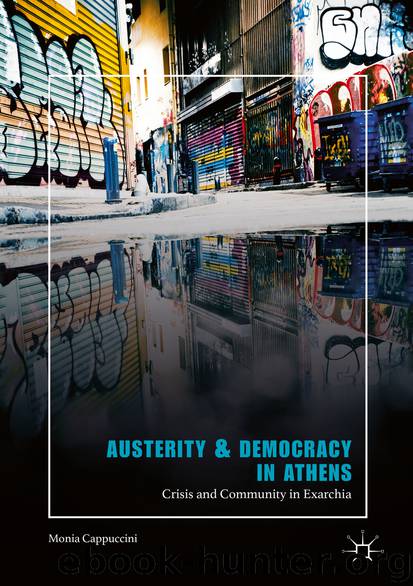Austerity & Democracy in Athens by Monia Cappuccini

Author:Monia Cappuccini
Language: eng
Format: epub
Publisher: Springer International Publishing, Cham
5.2.6 Manolada: A Chronicle of the Greece’s Modern Slavery and Injustice
It was not until Spring 2013 that Greece was reprimanded both by the Council of Europe and Amnesty International for its violations of human rights and crimes involving incitement to racial hatred and violence, encountered in two different inspections. In a detailed report on intolerance dealing with events that occurred in January of the same year, the Council of Europe (2013) spoke of “democracy at risk” when discussing the growing wave of racism, heavily influenced by Golden Dawn.
Amnesty International’s paper (2013), on the other hand, followed an inspection carried out in Manolada, a small town in the Western Peloponnese with approximately two thousand Greek inhabitants, renowned for its agricultural farms. In April 2013, it witnessed an unfortunate act of violence against the migrant workers responsible for harvesting strawberries in the surrounding fields. On 17 April, three foremen opened fire on a crowd of roughly two hundred Bengalis who were protesting after not having been paid the last six months of their salary, for a total unsettled sum of €150,000. Twenty-eight were wounded and many more left in critical conditions. Nicos Vangelatos, the fifty-six-year-old owner of the field and employer of the migrants, was arrested along with three security guards captured after a three-day search, all of whom were presumably affiliated with Golden Dawn (BBC 2013a).
The Amnesty International report also included other related cases of work exploitation, abuse, poor living conditions and ramshackle housing without access to clean water or basic health care. It should be mentioned that strawberry production in the area surrounding Manolada produces an annual turnover of €90 mn in exports to Russia and Germany and employs at least seven thousand migrant workers (four thousand Bengalis, and others from countries such as Bulgaria and Albania), the great majority of whom are without documents. Each of them earns €3.15 an hour, with seven-hour work days and must pay €20 a month for accommodation in the camps set up by the agricultural holdings.
Immediately following the events that took place in Manolada, a shocking video shot after the attack was published online by the newspaper Kathimerini (2013). Nevertheless, the reaction of the then Minister of Public Order, Nikos Dendias, was paradoxical to say the least: after criticising the episode and other cases of exploitation, he promptly deported the wounded migrants because their documents were not in order. In the meantime, solidarity movements invited the international community to boycott produce coming from Manolada, and the #bloodstrawberries campaign went viral on social networks, while information initiatives and other actions were organised in neighbourhood markets, including Exarchia.
On 31 July 2014, the court of Patras acquitted the four defendants accused of trafficking in labour, condemning only the two who actually shot into the crowd to fourteen and eight years respectively of prison for aggravated assault and illegal possession of arms, granting them however probation against bail charges of non-imprisonment (The Guardian 2014a). “I am ashamed of being Greek” is how the migrants’ lawyer, Moises Karabeyidis,
Download
This site does not store any files on its server. We only index and link to content provided by other sites. Please contact the content providers to delete copyright contents if any and email us, we'll remove relevant links or contents immediately.
| Anthropology | Archaeology |
| Philosophy | Politics & Government |
| Social Sciences | Sociology |
| Women's Studies |
Born to Run: by Christopher McDougall(7128)
The Leavers by Lisa Ko(6948)
iGen by Jean M. Twenge(5416)
Sapiens by Yuval Noah Harari(5372)
Spare by Prince Harry The Duke of Sussex(5197)
The Kite Runner by Khaled Hosseini(5181)
Machine Learning at Scale with H2O by Gregory Keys | David Whiting(4313)
Bullshit Jobs by David Graeber(4192)
Never by Ken Follett(3957)
Goodbye Paradise(3810)
Livewired by David Eagleman(3775)
Fairy Tale by Stephen King(3399)
A Dictionary of Sociology by Unknown(3085)
Harry Potter 4 - Harry Potter and The Goblet of Fire by J.K.Rowling(3074)
The Social Psychology of Inequality by Unknown(3031)
The Club by A.L. Brooks(2926)
Will by Will Smith(2920)
0041152001443424520 .pdf by Unknown(2846)
People of the Earth: An Introduction to World Prehistory by Dr. Brian Fagan & Nadia Durrani(2739)
